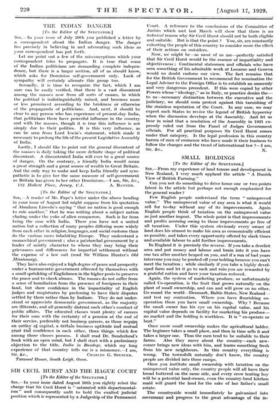SIR CECIL HURST AND THE HAGUE COURT
[To the Editor of the SPECTATOR.] SiR,—In your issue dated August 10th you rightly rebut the charge that Sir Cecil Hurst is " saturated with departmental- ism" and consequently unfit to hold the exalted judicial position which is represented by a Judgeship of the Permanent Court. A reference to the conclusions of the Committee of Jurists which met last March will show that there is no technical reason why Sir Cecil Hurst should not be both eligible and suitable. But is that the point ? You, sir, are constantly exhorting the people of this country to consider more the effect of their actions on outsiders.
Now, we might be—as most of us are—perfectly satisfied that Sir Cecil Hurst would be the essence of impartiality and objectiveness ; Continental statesmen and officials who have seen something of his admirable work at Locarno and Geneva would no doubt endorse our view. The fact remains that for the British Government to recommend for nomination the Legal Adviser to the Foreign Office is to establish an unseemly and very dangerous precedent. If this were copied by other Powers whose " ideology," as in Italy, or practice denies the— to us—necessary distinction between the executive and the judiciary, we should soon protest against this tarnishing of the stainless reputation of the Court. In any case, we may expect such States to revive the legend of British hypocrisy when the discussion develops at the Assembly. And let us bear in mind that a resolution of the Assembly in 1921 ex- pressly ruled out from the Panel of Judges Government officials. For all practical purposes Sir Cecil Hurst comes under that category. Is the legal profession in this country barren of men of eminence who have made it their business to follow the changes and the trend of international law ?—I am,
































 Previous page
Previous page